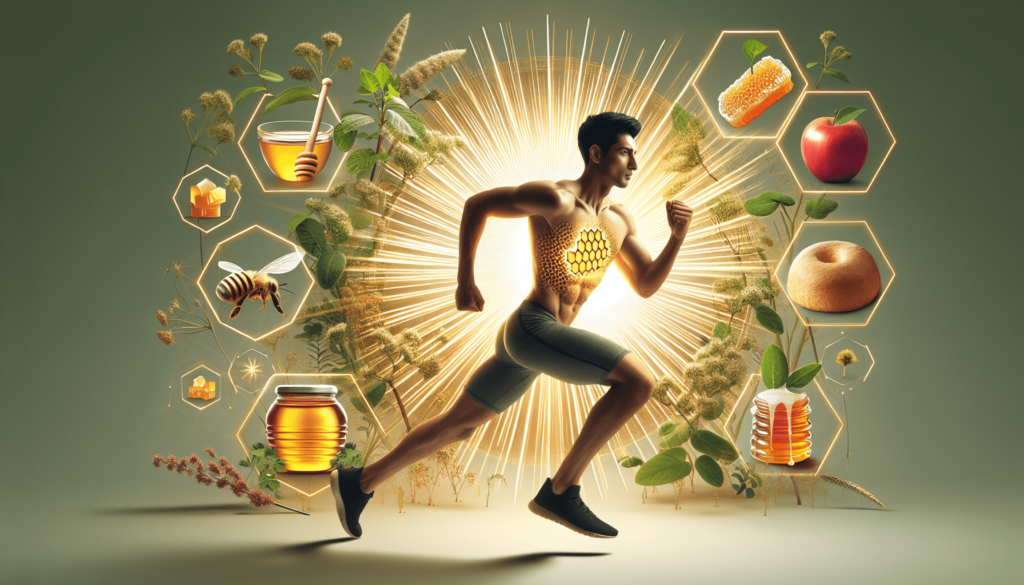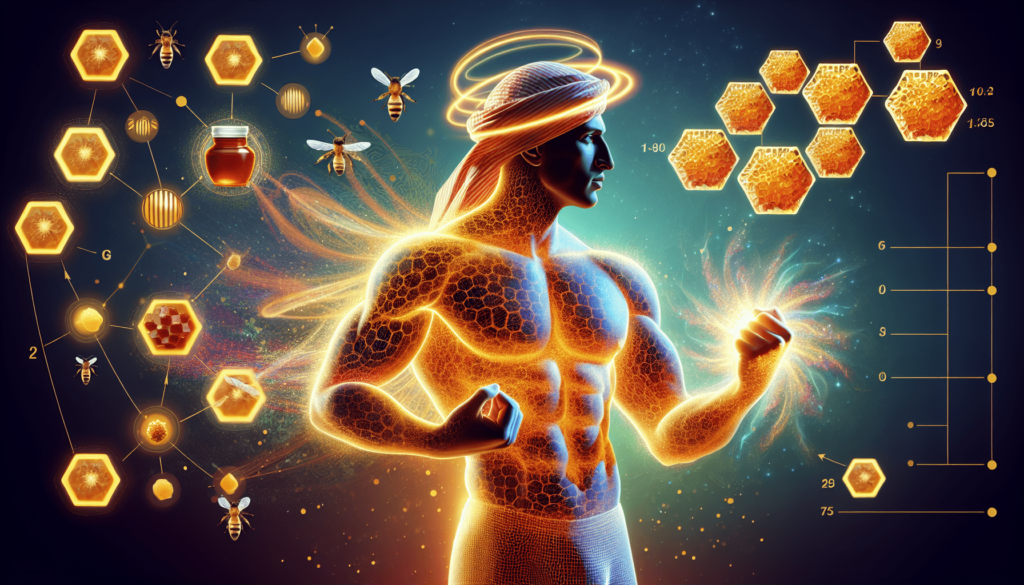Do you ever wonder what gives athletes that extra energy boost during intense workouts or competitions? Well, look no further than the sweet, golden nectar known as honey. Honey has long been praised for its numerous health benefits, but did you know that it can also enhance your energy levels and athletic performance? With its natural sugars and unique blend of nutrients, honey acts as a source of quick and sustained energy for athletes, helping them go that extra mile and push their limits on the field or in the gym. So, whether you’re a professional athlete or simply looking to elevate your fitness routine, honey might just be the secret ingredient you need to take your performance to new heights.

Honey as a Natural Energy Source
Honey, a delicious and natural sweetener, has long been valued not only for its taste but also for its ability to provide a quick and sustained boost of energy. This golden liquid is packed with carbohydrates, making it an excellent source of fuel for athletes and individuals looking for a natural energy source. In this article, we will explore the various ways in which honey can contribute to energy levels and enhance athletic performance. From its nutritional benefits to its impact on energy production, we will delve into the science behind honey’s energy-boosting properties and provide practical tips for athletes. So, grab a spoonful of honey and let’s dive in!
Carbohydrates in Honey
Carbohydrates are the body’s primary source of energy, providing fuel for all metabolic processes. Honey contains a mix of simple carbohydrates, such as glucose and fructose, and complex carbohydrates, such as oligosaccharides. These carbohydrates are easily digested and rapidly absorbed by the body, leading to a quick release of energy. Unlike processed sugars, which can cause blood sugar spikes and crashes, honey offers a more stable energy supply due to its balanced carbohydrate composition.
Quick Energy Boost
When you need a sudden burst of energy, whether it’s before a workout or to combat an afternoon slump, honey can provide an immediate pick-me-up. The high concentration of easily digestible carbohydrates in honey allows for fast absorption and utilization by the body. The glucose found in honey is quickly absorbed into the bloodstream and taken up by the muscles and organs, providing a rapid source of fuel. This makes honey an excellent choice for athletes who require instant energy during training or competitions.
Sustained Energy Release
While honey can deliver a quick energy boost, it also offers a sustained release of energy that can benefit athletes engaged in endurance activities. The combination of simple and complex carbohydrates in honey provides a more gradual and prolonged release of energy compared to simple sugars alone. This means that honey can help athletes maintain a steady level of energy throughout their training sessions or competitions without experiencing the dreaded “sugar crash.” The sustained energy release from honey can be particularly beneficial for endurance sports like long-distance running, cycling, or swimming.
Nutritional Benefits of Honey
Aside from its role as an energy source, honey also provides a range of nutritional benefits that can support athletic performance and overall well-being. Let’s explore some of these benefits.
Vitamins and Minerals
Honey contains trace amounts of vitamins and minerals that are essential for maintaining optimal health. These include B vitamins, vitamin C, calcium, iron, and magnesium, among others. While the amounts of these nutrients may be relatively small in honey, they still contribute to the overall nutritional value of this natural sweetener. B vitamins, in particular, are crucial for energy production and the metabolism of carbohydrates, fats, and proteins, making honey a valuable addition to an athlete’s diet.
Antioxidant Properties
One of the remarkable aspects of honey is its antioxidant properties. Antioxidants help protect the body against the damaging effects of free radicals, which are unstable molecules associated with various chronic diseases and inflammation. Honey contains several antioxidants, including flavonoids and phenolic compounds, which can help reduce oxidative stress in the body. By combatting oxidative stress, honey may support exercise recovery, reduce muscle damage, and enhance overall athletic performance.
Glycemic Index of Honey
The glycemic index (GI) is a measure of how quickly carbohydrates in a food raise blood sugar levels. Foods with a high GI are digested and absorbed rapidly, resulting in a quick spike in blood sugar. In contrast, foods with a low GI are digested more slowly, leading to a gradual and sustained rise in blood sugar. Honey falls in the intermediate range on the glycemic index, with a relatively moderate impact on blood sugar levels compared to other sweeteners. This makes honey a favorable choice for athletes who want to maintain stable blood sugar levels and energy throughout their workouts or competitions.
Impact of Honey on Athletic Performance
Now that we have explored the nutritional benefits of honey, let’s delve into how it can specifically enhance athletic performance.
Pre-Workout Fuel
As mentioned earlier, honey is an excellent source of instant energy due to its high carbohydrate content. Consuming honey before a workout can provide a readily available source of fuel for your muscles, enabling you to perform at your best. Whether you’re hitting the gym, going for a run, or participating in a team sport, a small serving of honey prior to exercise can give you the energy boost you need to power through your training session.
Enhanced Endurance
For athletes engaged in endurance activities, maintaining adequate energy levels throughout prolonged exercise is crucial. Honey’s ability to provide a durable and sustained release of energy makes it an ideal choice for endurance athletes. By consuming honey during prolonged workouts or competitions, athletes can avoid energy depletion and prevent fatigue. This sustained energy supply can help athletes maintain their performance levels and push through the rigors of endurance sports.
Improved Recovery
Exercise-induced muscle damage and inflammation are inevitable aspects of intense physical activity. The good news is that honey may aid in post-workout recovery. The antioxidants present in honey can help reduce inflammation and promote tissue repair. Additionally, the carbohydrates in honey can replenish muscle glycogen stores that are depleted during exercise, facilitating faster recovery and muscle repair. Including honey as part of your post-workout nutrition can aid in restoring your energy levels and supporting a speedy recovery.

The Role of Carbohydrates in Energy Production
To truly understand how honey contributes to energy levels and athletic performance, it’s essential to grasp the role of carbohydrates in energy production.
Simple Carbohydrates vs. Complex Carbohydrates
Carbohydrates can be classified into two main types: simple and complex. Simple carbohydrates, such as those found in table sugar and many processed foods, consist of one or two sugar molecules and are quickly broken down and absorbed by the body. Complex carbohydrates, on the other hand, contain longer chains of sugar molecules and take longer to break down and digest. Honey provides a combination of both simple and complex carbohydrates, making it a balanced and efficient source of energy.
Glycogen Stores and Muscle Fuel
When you consume carbohydrates, your body converts them into glucose, which serves as the primary fuel source for your muscles and brain. Any excess glucose is stored in the form of glycogen in your muscles and liver for future use. During exercise, your muscles rely on these glycogen stores to fuel their activity. As you exercise for longer periods or at higher intensities, your glycogen stores become progressively depleted. Honey consumption can help replenish these glycogen stores, ensuring that your muscles have an adequate supply of energy for optimal performance.
Effects on Performance
By now, you may be wondering how the type of carbohydrates consumed can affect your performance. While simple carbohydrates can provide a quick boost of energy, they are rapidly metabolized and may lead to a subsequent energy crash. In contrast, complex carbohydrates take longer to digest, providing a more sustained release of energy. Honey, with its blend of simple and complex carbohydrates, offers the best of both worlds. The quick burst of energy from simple carbohydrates is complemented by the prolonged energy release from complex carbohydrates, resulting in improved endurance and performance.
The Science Behind Honey’s Energy Benefits
The energy benefits of honey are rooted in its unique composition and the way it is metabolized by the body. Let’s take a closer look at the scientific mechanisms behind honey’s energy-boosting properties.
Fructose and Glucose Ratio in Honey
Honey typically consists of approximately 38% fructose and 31% glucose, with the remaining percentage made up of other sugars, water, and trace compounds. This fructose-to-glucose ratio is essential for honey’s energy benefits. While glucose is rapidly absorbed and utilized by the body, fructose is processed differently. Fructose is converted into glucose in the liver, providing a slower and more sustained release of energy. This balanced combination of fructose and glucose ensures a steady supply of fuel during physical activity.
Metabolism of Honey
When you consume honey, enzymes in your saliva and stomach break down the carbohydrates into their individual sugar molecules, primarily glucose and fructose. These sugars are then absorbed into the bloodstream and transported to the cells throughout your body. Once inside the cells, glucose is either used immediately for energy or stored as glycogen for later use. Fructose, as mentioned earlier, undergoes conversion in the liver into glucose or is stored as liver glycogen. This efficient metabolism of honey ensures a continuous supply of energy for your body during exercise.
Hormonal Response to Honey Consumption
The consumption of honey triggers a hormonal response in the body that further enhances its energy benefits. When you consume carbohydrates, particularly those with a moderate glycemic index like honey, insulin is released by the pancreas. Insulin is a hormone that helps transport glucose from the bloodstream into the cells. By promoting glucose uptake, insulin facilitates the utilization of honey’s carbohydrates for energy. The hormonal response to honey consumption helps optimize the body’s energy production and utilization, leading to improved athletic performance.
Comparing Honey to Other Energy Sources
While honey shines as a natural energy source, how does it stack up against other commonly used alternatives? Let’s compare honey to processed sugars, artificial energy drinks, and sports gels and bars.
Honey vs. Processed Sugars
Processed sugars, such as white table sugar or high-fructose corn syrup, are often used as sweeteners and energy sources. However, these sugars lack the nutritional value and natural compounds that honey offers. Unlike processed sugars, which are refined and stripped of nutrients, honey contains trace amounts of vitamins, minerals, and antioxidants. Additionally, honey’s fructose-to-glucose ratio provides a more balanced source of energy compared to the high concentrations of glucose found in many processed sugars. Choosing honey over processed sugars can provide not only an energy boost but also additional nutritional benefits.
Honey vs. Artificial Energy Drinks
Artificial energy drinks are marketed as providing a quick and convenient source of energy. However, many of these drinks are loaded with synthetic ingredients and excessive amounts of sugar or caffeine. Honey, in contrast, is a natural alternative that offers similar, if not better, energy-boosting properties without the artificial additives. Its carbohydrate composition allows for rapid absorption and utilization, while its moderate glycemic index ensures a sustained release of energy. For athletes seeking a natural and wholesome energy source, honey is the way to go.
Honey vs. Sports Gels and Bars
Sports gels and bars are often used by athletes to refuel during prolonged exercise. These products typically contain a combination of carbohydrates, electrolytes, and sometimes protein. While sports gels and bars can be effective, they are often heavily processed and may contain artificial ingredients. Honey, on the other hand, offers a simpler and more natural alternative. It provides the necessary carbohydrates for energy replenishment, and its natural sugars are believed to be easier on the stomach compared to the refined sugars found in some sports gels. Honey can be used as a standalone energy source or incorporated into homemade sports drinks, gels, or bars for a nutritious and tasty boost.
Practical Tips for Athletes
Now that we know the benefits of honey for energy and athletic performance, let’s explore some practical ways to incorporate honey into your routine.
Incorporating Honey into Pre-Workout Meals
Before a workout or competition, consider adding a tablespoon of honey to your pre-workout meal or snack. A dollop of honey on whole-grain toast, mixed into your yogurt, or stirred into your oatmeal can provide a quick and easily digestible source of energy. Combining honey with other nutrient-dense foods, such as fruits, nuts, or lean proteins, can ensure sustained energy throughout your workout.
Using Honey as a Natural Sweetener
Instead of reaching for processed sugar or artificial sweeteners, consider substituting honey in your beverages and baked goods. Whether it’s sweetening your tea or coffee, drizzling honey over your pancakes, or using it as a replacement for sugar in your favorite recipes, honey can add a natural and flavorful sweetness to your meals. Not only will you enjoy the delightful taste, but you’ll also reap the nutritional benefits and sustained energy that honey provides.
Optimal Timing for Honey Consumption
While honey can be consumed at any time, certain timings may be more beneficial for maximizing its energy-boosting potential. Consuming honey approximately 30 minutes before a workout or endurance event can provide a quick release of energy. Additionally, consuming honey during prolonged exercise, such as sipping on a honey-based sports drink or taking small bites of honey-filled energy bars, can help maintain energy levels and delay fatigue. Experiment with different timings and quantities to find the optimal honey consumption strategy for your specific needs.
Considerations for Different Sports
As each sport places unique demands on the body, let’s explore how honey can cater to the specific needs of athletes in different disciplines.
Endurance Sports
For endurance athletes, such as marathon runners, triathletes, or cyclists, honey can be a valuable source of sustained energy. Consuming honey before and during prolonged exercise can help maintain glycogen stores, delay fatigue, and enhance endurance. In these sports, small increments of honey at regular intervals, such as a tablespoon every 30-45 minutes, can provide the necessary energy without overwhelming the digestive system.
Strength and Power Sports
Strength and power athletes, such as weightlifters, powerlifters, or sprinters, also stand to benefit from honey’s energy-boosting properties. While these sports may not require the same prolonged endurance as endurance sports, short bursts of high-intensity activity still rely heavily on glycogen stores. Consuming honey prior to these activities can help ensure optimal muscle fuel and provide an extra edge during explosive movements.
Team Sports
Team sports, such as soccer, basketball, or hockey, often involve a combination of endurance, strength, and power. In these sports, honey can be a versatile energy source for both the longer duration of a match or game and the high-intensity bursts required during sprints or quick movements. Honey can be consumed before, during, and after team sports to support sustained energy levels, aid in recovery, and optimize performance in dynamic environments.
Potential Side Effects and Risks
While honey offers many benefits, it’s essential to be aware of potential side effects and risks associated with its consumption.
Allergic Reactions to Honey
Honey is generally safe for consumption, but it can cause allergic reactions in some individuals. Allergies to pollen or specific flowers can lead to allergic reactions when consuming honey made from those sources. Symptoms of a honey allergy can range from mild to severe and may include itching, hives, swelling, or difficulty breathing. If you suspect an allergy to honey, it’s best to consult with a healthcare professional and get tested to identify any potential allergens.
Excessive Calorie Intake
While honey is a natural and nutritious sweetener, its high calorie content should be taken into account, especially for individuals trying to manage their weight. Honey is relatively calorie-dense, with about 64 calories per tablespoon. As with any food, moderation is key. Athletes looking to fuel their workouts and maintain energy levels can incorporate honey into their diets appropriately, while individuals on weight management programs may need to consider portion control and fully account for the calories in honey.
Honey Contamination
Honey is a natural product, and variations in quality and contamination can occur. In some cases, honey may be contaminated with bacteria, fungal toxins, or pesticides. To minimize the risk, it is advisable to choose honey from reputable and reliable sources. Additionally, individuals with compromised immune systems or specific health conditions may need to exercise caution and seek guidance from a healthcare professional before consuming honey.
Conclusion
In conclusion, honey serves as a fantastic natural energy booster with numerous benefits for athletic performance. Its rich carbohydrate profile, quick energy release, and sustained energy supply make it an ideal choice for athletes and individuals looking to enhance their energy levels. The nutritional benefits of honey, including vitamins, minerals, antioxidants, and its moderate glycemic index, further contribute to its appeal as a natural sweetener and energy source. Incorporating honey into pre-workout meals, using it as a natural sweetener, and timing its consumption strategically can optimize its energy-boosting potential. However, it is essential to be mindful of potential allergic reactions, excessive caloric intake, and honey quality to ensure safe and informed use. So, whether you’re an endurance athlete, a strength enthusiast, or a team player, consider harnessing the power of honey to fuel your performance and enjoy its many natural benefits. Let honey be your sweet companion on the journey to optimal energy and athletic prowess!
